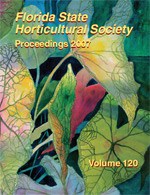Abstract
The Asian citrus psyllid [Diaphorina citri Kuwayama (Homoptera: Psyllidae)] is the insect responsible for transmission [ of the Asian strain of the citrus greening pathogen (Candidatus Liberibacter asiaticus) in Florida. In citrus producing countries where both citrus psyllids and greening disease occur, insecticide use to reduce psyllid populations is an important component of greening management programs. Managing psyllids on young non-bearing citrus is important since these trees continually produce new flushes throughout the year that support the development of psyllid populations. Thus, these trees have a greater potential of becoming infected by the greening pathogen at a much higher rate than mature trees within the same grove. The most reliable method of protecting non-bearing trees from pests such as psyllids has been the use of the soil-applied systemic insecticide imidacloprid. However, due to its widespread use, there are concerns about the potential development of resistance to imidacloprid. This work presents results of field trials conducted during 2006 to evaluate the effectiveness of additional soil-applied systemic insecticides for controlling psyllids on non-bearing citrus. Soil applications of the two neonicotinoid insecticides imidacloprid and thiamethoxam provided the greatest reduction in psyllid populations compared with the other soil-applied products tested. There is an urgent need to develop additional soil-applied systemic insecticides that can be used for psyllid management on non-bearing citrus.

